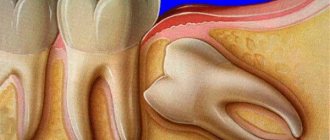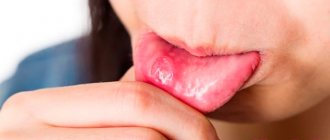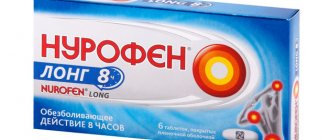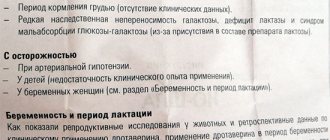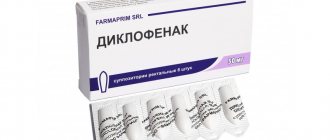For every person, dental disease will not be a revelation. A healthy tooth itself, not damaged in any way, does not hurt or bother a person. The presence of toothache indicates a developing problem, which causes discomfort.
Normally, toothache goes away without an increase in body temperature. If it is present, we can talk about the progression of the inflammatory process, which developed from a dental disease.
This combination of toothache and fever requires a visit to the dentist.
Why does the temperature rise during toothache?
Typically, toothache due to caries or pulpitis is not accompanied by an increase in body temperature. Its increase (more than 37 degrees) indicates that the problem has developed into more serious inflammation.
The causes of high fever during toothache can be:
- Periodontitis (inflammation of the periodontium)
, the infection extends beyond the pulp into the periodontal tissue. The disease is also characterized by swelling and redness of the gums around the tooth, the feeling of an “overgrown tooth,” severe pain when pressing on the tooth, as well as inflammation of the lymph nodes. If left untreated, this disease becomes purulent and can cause inflammation of the periosteum, acute sinusitis and osteomyelitis. - Periostitis or flux (inflammation of the periosteum)
. Purulent inflammation forms an abscess that can break through the fistulous tract. In addition to high fever (up to 38 degrees) and toothache, swelling of the gums, the occurrence of an abscess and numbness of areas of the face are characteristic. The most dangerous complication of the disease is osteomyelitis. - Alveolitis (inflammation of the walls of the socket)
can occur after tooth extraction and is always accompanied by high temperature. - Otitis media (inflammation of the middle ear)
. The infectious inflammatory process is often accompanied by toothache, which radiates to the temple, back of the head or jaw. The temperature can rise to 40 degrees, while the patient does not understand which organ is the source of pain.
All of the above diseases require immediate medical attention. Without timely treatment, the consequences of inflammation will be disastrous.
Is fever dangerous after dental treatment?
An increase in body temperature indicates a protective reaction of the body - it can occur as a symptom of serious diseases and complications, or as a result of stressful situations. In some cases, the appearance of fever after dental treatment can be considered normal, in others you should consult a doctor as soon as possible, since such a symptom may indicate a complication after the therapy.
- What could be causing the increase in temperature?
- In what cases is it necessary to see a doctor?
- What to do if the temperature rises after dental procedures?
What could be causing the increase in temperature?
The recovery period after treatment may be accompanied by symptoms such as weakness, pain (depending on the type of therapy), drowsiness, and increased body temperature. If the fever does not reach high levels (no higher than 38 degrees), such a reaction can be considered normal if it is present in the first couple of days after dental treatment.
In addition to a reaction to a complex procedure, the causes of fever can be:
- Infection. This complication occurs quite often, but it does not always mean a doctor’s mistake (failure to comply with the technology of the procedure). Thus, the addition of an infection may be associated with complex treatment, for example, purulent periodontitis. The infection can also be caused by the patient himself if he does not follow the doctor’s recommendations during the rehabilitation period.
- Serious interventions. Surgical interventions are often accompanied by the appearance of fever in the postoperative period. This phenomenon often occurs during complex tooth extraction (for example, “eight”) or during implantation (at any stage of the procedure).
- Stress. A short-term and slight increase in temperature can be associated with stress and often occurs in children.
- Another disease. Sometimes a fever may not be associated with the dental treatment itself, but is a symptom of ARVI or another illness.
Only a doctor can determine the cause of persistent fever.
In what cases is it necessary to see a doctor?
A low temperature, reaching 37.5-38 degrees, coupled with a normal general condition, is the norm after many manipulations performed by dentists. But only if the fever persists for the first couple of days after visiting the dental office. If during this period the temperature has not decreased or the condition has noticeably worsened, you must contact the dentist, where the doctor will conduct a thorough examination, determine why the fever appeared, and, if necessary, provide additional treatment.
If the following conditions appear after treatment, you should consult a doctor immediately:
- A significant increase in temperature (indicators above 38 degrees often indicate an infection, which requires urgent treatment);
- Headache and toothache (gums and jaw may also hurt);
- Severe weakness;
- swelling of the gums or cheeks;
- Severe redness of the gums in the area of the treated tooth.
Often, changes in temperature indicators become a consequence of serious dental interventions - removal of a dental unit (especially a wisdom tooth), opening of gumboil, treatment of pulpitis or periodontitis. In addition to the natural reaction to surgery, in such cases the likelihood of complications developing is quite high, compared to the treatment of shallow caries and other “simple” procedures.
If a child develops fever after treatment or removal of a baby tooth, it is necessary to carefully monitor his condition for timely detection of the above-mentioned unfavorable symptoms. An increase in body temperature after dental treatment in children is often associated with stress, but it is extremely important not to miss the complication - the child cannot always explain what is bothering him.
What to do if the temperature rises after dental procedures?
If you have a fever and are in general normal condition, you can take any antipyretic drug at home; children are given drugs based on paracetamol or ibuprofen. But you should not abuse medications - if the temperature does not drop for more than two days, you should seek help from a doctor, and not treat yourself. In some cases, additional diagnostics may be required - an x-ray, which will help determine the cause of the ailment. As a result, additional treatment at the dentist or antibiotics and other medications may be prescribed.
An increase in body temperature after dental procedures is a common occurrence. It is important to monitor your condition during the recovery period and consult a specialist in time if necessary.
Content in the “Articles” category
We are always in touch and easy to reach.
8-800-775-18-18 (toll-free throughout Russia)
The Noris Stom company specializes in technology development - developing modern solutions in the field of dental implantology. Noris stom simplifies the work of doctors and improves the quality of life of our patients around the world.
Noris Stom 8-800-775-18-18 (free call throughout Russia)
107076, Russia, Moscow st. m. Sokolniki st. Matrosskaya Tishina, 23, building 2, of. 16 8 8 [email protected]
Copyright © 2015-2018 Point-digital / All rights reserved.
Thank you for visiting our site. We provide you with the following information to explain our policies for collecting, storing and processing information collected on our website. We also inform you regarding the use of your personal data.
WHAT IS “INFORMATION CONFIDENTIALITY”?
We are committed to protecting the privacy of the personal information of customers who may be identified in any way and who visit the site and use its services (hereinafter referred to as the “Services”). The confidentiality condition applies to all information that our site can obtain about the user during his stay and which, in principle, can be correlated with this specific user. This agreement also applies to the websites of partner companies with which we have corresponding obligatory relationships (hereinafter referred to as “Partners”).
Obtaining and using personal information
Our site receives personal information about you when you register, when you use some of our services or products, when you are on the site, and when you use the services of our partners. We may also collect data about you in the event that you, having agreed to this “Privacy Policy” on our website, have not completed the registration process. The types of personal data that may be collected on this site during the registration process, as well as making orders and receiving any services may include your first name, middle name and last name, postal address, email, telephone number. Any of your personal information obtained on the site remains your property. However, by submitting your personal information to us, you trust us to use your personal information for any lawful use, including, without limitation: A. completing an order for a product or service B. transferring your personal information to a third party for the purpose of completing an order for a product or service provided by a third party on our website. B. Display of advertising offers through telemarketing, email marketing, pop-up windows, banner advertising. D. For review, subscription, unsubscribe, content improvement and feedback purposes. You agree that we may contact you at any time regarding updates and/or any other information that we deem relevant to your continued use of our site. We also reserve the right to release information about a current or past user if we believe that our site has been used by that user to commit illegal activity.
We may provide our Site's third party partners with information about users who have previously received targeted advertising campaigns for the purpose of shaping future advertising campaigns and updating visitor information used to generate statistical data.
We are not responsible for the accuracy, privacy, or user agreements of any third party partners that may advertise on our site. Any third-party advertising materials posted on our site that belong to third-party advertisers are in no way associated with our site. Our website automatically receives and records technical information from your browser in server logs: IP address, cookies, products requested and pages visited. This information is recorded to improve the quality of service for users of our website. We also ask for an email address (e-mail), which is needed to log in to the system, quickly and securely recover your password, or so that the administration of our site can contact you in both emergency cases (for example, payment problems) and to conduct the process of business communication in the case of provision of services. By agreeing to this privacy policy, you agree to receive newsletters from us. You can unsubscribe from receiving these mailings at any time.
Your choices regarding the use of information
During the registration process and/or when you submit personal information to us on our Site, you have the opportunity to agree or disagree with the invitation to share your personal information with our third party partners for the purpose of conducting marketing communications with you. If you are contacted by any of these third party partners, you must notify them personally of your preferences regarding the use of your personal information. Notwithstanding the foregoing, we may work with third party partners who may (either themselves or through their partners) place or read unique cookies on your web browser. These cookies enable you to receive more personalized advertising, content or services offered to you. To process these cookies, we may transmit a software-based unique encrypted or hashed (not human-readable) identifier associated with your email address to online advertisers with whom we work, who may place cookies on your computer. No personal information by which you can be identified is associated with these cookies. You can refuse to have cookies placed on your computer using your browser settings.
Non-identifying technical information
We reserve the right to collect non-personally identifiable technical information about you when you visit various pages of our Site. This non-identifying technical information includes, without limitation: the type of browser you use, your IP address, the type of operating system you use, and the domain name of your Internet service provider. We use this non-identifying technical information to improve the appearance and content of our Site and to enable us to personalize your online experience. We may also use this information to analyze use of the Site, as well as to offer you products and services. We also reserve the right to use aggregated or grouped data about our visitors for purposes not prohibited by law. Aggregated or grouped data is information that describes the demographics, usage and/or characteristics of our users as a general group. By visiting and providing us with your personal information, you allow us to provide such information to third party partners. We may also use cookies to improve your experience on our site. Cookies are text files that we store in your computer browser to store your preferences and settings. We use Cookies to understand how the site is used, to personalize your online experience, and to improve the content and offerings on our Site.
We do not knowingly store information about minors under 18 years of age. We warn parents and recommend that they supervise their children's use of the Internet.
We will strive to prevent unauthorized access to your personal information, however, no data transmission over the Internet, mobile device or wireless device can be guaranteed to be 100% secure. We will continue to strengthen our security system as new technologies and methods become available. We strongly recommend that you not disclose your password to anyone. If you have forgotten your password, you can use the automatic password recovery system or, if it is unavailable, we will ask you to provide a document to confirm your identity and send you an email containing a link that will allow you to reset your password and set a new one. Please remember that you control the information you provide to us when using the Services. You are ultimately responsible for maintaining the confidentiality of your identity, passwords and/or any other personal information in your possession while using the Services. Always be careful and responsible with your personal information. We are not responsible for, and cannot control, others' use of any information you provide to them, and you should use caution in choosing the personal information you provide to third parties through the Services. Similarly, we are not responsible for the content of personal information or other information that you receive from other users through the Services, and you release us from any liability in connection with the content of any personal information or other information that you may obtain through the use of the Services. We cannot guarantee, and we do not have any responsibility for the verification, accuracy of personal information or other information provided by third parties. You release us from any liability in connection with our use of such personal information or other information about others.
By using this Site and/or agreeing to receive information via email from us, you also agree to this Privacy Policy. We reserve the right, at our sole discretion, to change, add and/or remove portions of this Privacy Policy at any time. All changes to the Privacy Policy come into force immediately from the moment they are posted on the Site. Please check this page periodically for updates. Your continued use of the Site and/or consent to our email communications following the posting of changes to this Privacy Policy will constitute your acceptance of any and all changes.
Treatment options
What should you do if your teeth and gums become inflamed due to a cold, but you want to quickly get rid of the acute discomfort? To begin with, it is worth finding out the reason why the jaw aches and aggravates the situation, because with a cold facial nerve or granuloma, symptomatic treatment of ARVI alone will not be enough; specific therapy is required here.
To make toothache go away at least temporarily, there are several ways:
- take a painkiller from the group of anesthetics and anti-inflammatory drugs, for example, Ibuprofen, Paracetamol, Nimesil, Nurofen, No-spa;
- rinse your mouth as often as possible with a solution of Furacilin, hydrogen peroxide, a decoction of chamomile, calendula or plantain (the procedure is carried out 3-4 times a day), you can also prepare a soda-salt composition or add 1-2 drops of iodine to it;
- prepare a rinse solution with alcohol tincture of propolis and use it twice a day to obtain an antimicrobial and analgesic effect;
- make a warm compress (if the pain is caused by inflammation of the facial nerve or a viral infection); if you have granuloma or periodontitis, you should never heat the jaw, this will aggravate the inflammation in the tissues;
- drink as much fluid as possible to eliminate dryness of the oral mucosa - as already mentioned, it is provoked by snot and constant nasal congestion.
Read also: Is it possible to drink water after filling a tooth? A good effect for toothache caused by a cold is provided by dissolving mint tablets, they are often found in the home medicine cabinet, one tablet should be dissolved under the tongue until completely dissolved, relief will come in 10-15 minutes. You can buy dental drops at the pharmacy, apply the required amount to a cotton swab and apply it to the source of pain. The drug contains valerian extract and other painkillers and sedatives, so it can be used to quickly eliminate discomfort.
Treatment of sinusitis involves prescribing antibiotics, to which the causative agent of the infection is sensitive, and rinsing the nose with saline solution at home or in an ENT doctor’s office. In advanced situations, the doctor uses a YAMIK catheter to suck out purulent contents from the sinuses and then rinse with antiseptics.
The fact that the teeth began to hurt due to sinusitis is indicated at an early stage by the sign that the upper molars, the roots of which are in close contact with the paranasal sinuses, ache. For inflammation of the facial nerve, the patient is advised to take antiviral, analgesic and anti-inflammatory drugs (non-hormonal and corticosteroid). Neuroprotectors, agents that restore the structure of osteochondral tissue, and physiotherapy are also prescribed.
To cure granuloma, dentistry first involves conservative methods of therapy - taking antibacterial drugs, anesthetics and anti-inflammatory tablets. But these measures will only help with small amounts of suppuration and the absence of an inflammatory process in the surrounding tissues. If pus has already accumulated in the gum cavity, the doctor must open the bag and pump out the contents; this procedure is carried out under local anesthesia, after which the patient must also drink antibiotics.
To lower the temperature or not to lower it?
If the thermometer does not rise above 38 degrees, taking antipyretics is not required - this is the body’s protective reaction to the invasion of bacteria and viruses. To alleviate the condition, painkillers and anti-inflammatory drugs are prescribed. It makes sense to lower the temperature only in cases where it rises significantly above 38 degrees.
It's not always worth lowering the temperature
How to relieve pain for a short time?
If toothache and high fever plague you all night, and the dentist will only open in the morning, try to calm the discomfort for a while. Here are some effective ways to relieve dental pain:
- Rinse your mouth. You can temporarily soothe toothache with the help of special rinses. The most effective pain reliever is Asepta Active mouth rinse, which combines a combination of anti-inflammatory, analgesic and antimicrobial components (chlorhexidine and benzydamine). This product provides the antiseptic effect of the rinse aid and at the same time relieves inflammation and pain.
- Apply essential oils. If the cause of high fever and toothache is pulpitis or periodontitis, you can apply a cotton swab moistened with essential oils of camphor, fir or clove to the inflamed area. If such products are not in the medicine cabinet, Corvalol and Valocordin will do. The tampon is kept in place for no longer than 20 minutes.
- Propolis will help you forget about pain for a couple of hours. You can rinse your mouth with a tincture solution or simply apply a bee product lozenge to your gum or sore tooth.
- Garlic, onion and salt also help with toothache. To prepare a natural medicine, you need to take these three products in equal parts, grind them into a puree, and then mix. The mixture should be applied to the inflamed area, cover the top with a tampon and hold for 20-30 minutes.
- When you have a toothache, it is recommended to stay in a horizontal position less, as this increases the volume of blood circulation in the periodontal tissues. It is strictly forbidden to heat the diseased area and chew food on the side of the diseased tooth.
- If the pain torments you and does not calm down, try to distract yourself before visiting the doctor: watch a TV series, do something you love, or just wash the dishes or do the cleaning. Remember, the more you think about the pain, the worse it becomes.
So, now you know how to briefly relieve toothache with fever, and hold out for a few hours before visiting the doctor. Be attentive to yourself and don't let your smiles slip away.
Causes of periodontitis
One of the causes of elevated body temperature may be periodontitis. This is a complex disease that occurs as a complication against the background of processes such as caries and pulpitis. In such cases, inflammation affects not only the tooth itself, but also nearby tissues. The development of this process is preceded by prolonged pain caused by bacterial damage to the tooth tissue.
Periodontitis is one of the causes of fever
Symptoms of periodontitis include fever and toothache. The pain is constant, acute, does not decrease when taking analgesics and intensifies with any load on the diseased tooth. In addition to these, the following symptoms are observed:
- swelling of the gums adjacent to the diseased tooth;
- swelling of the cheek on one side;
- enlarged and painful submandibular lymph nodes;
- sensation of changing the size of the diseased tooth.
Periodontitis therapy
As a rule, in case of periodontitis, it is recommended to remove a damaged tooth. The possibility of its preservation is considered in each case individually and depends on the nature of the damage and the severity of the disease. As a therapy for periodontitis, anti-inflammatory drugs with calcium hydroxide are used, which are placed in previously sanitized dental canals. This treatment takes a long time due to the fact that the drug acts slowly.
Important ! If the process is complicated by the presence of a cyst on the tooth, the apex of the root or the entire tooth is removed.
If the disease is severe, the tooth may be removed
Laser therapy
Improvement of sinusitis with the help of a laser is carried out to reduce toothache, reduce temperature and improve the effect of prescribed medications.
The treatment of sinusitis is carried out by an otolaryngologist who prescribes a course of antimicrobial medications. Additional treatment measures are prescribed drugs to improve the discharge of mucus from the maxillary sinuses and reduce swelling of the mucous part.
To remove a large accumulation of pus in the sinuses, a procedure is performed to pierce the sinus itself or the eardrum. After this procedure, the pain subsides.
Damage to the area of the trigeminal nerve, which connects the nerves of the jaw with the central nervous system, is treated by a neurologist. Treatment is aimed at eliminating symptoms, i.e. destruction of infection, tumor or cyst.
Sinusitis
Another disease not related to teeth, but which gives characteristic pain and temperature is sinusitis. Caused by inflammation of the maxillary sinuses. They destroy the wall adjacent to the oral cavity, so the sensation is reminiscent of toothache.
Sinusitis causes similar symptoms
Sinusitis can result from the following diseases:
- ARVI;
- acute or chronic rhinitis;
- chronic tonsillitis (inflammation of the tonsils);
- damage to the teeth of the upper jaw by caries.
Important ! Patients with such anatomical features as narrowing of the nasal passages and deviated septum are at risk. Another cause of sinusitis is errors during surgical interventions on the upper jaw.
With sinusitis it is also difficult to breathe through the nose
One of the symptoms of sinusitis is an increase in temperature to 39 degrees. The disease is accompanied by severe pain in the forehead, nose, maxillary sinuses and cheekbones. It becomes difficult to breathe through the nose, and as the disease progresses, greenish discharge appears.
Consumer reviews about Asepta Active mouthwash
julia-06 (irecommend.ru):
“A very good rinse for problem gums.
She had never encountered the problem of bleeding gums, but at her next visit to the dentist she noticed that when she only lightly touched her gums, they began to bleed. So the dentist gave me a mini version of Paradontax toothpaste and advised me to use a mouthwash after brushing my teeth. Mom bought Asepta active mouth rinse.
For some reason I used to be very skeptical about such remedies, but as it turned out, in practice it helps very well. My problem went away completely, my gums stopped bleeding. I don’t even want to read the ingredients and go into its details, it’s unlikely that everything is super natural, but since it helps, I give the mouthwash a solid 5 points. Of course, each case is individual, but I will recommend it based on my experience. And the price of the rinse aid is quite reasonable.”
Ekaterina773 (irecommend.ru):
“I use Asepta mouthwash in combination with toothpaste and gel from the same company. My dentist recommended it to me, and I highly recommend it to you! My gums stopped bleeding after the second use. The mouthwash, unlike the paste, has an astringent effect, and makes the tongue a little numb. It costs around 150 rubles, but exceeds this money 1000 times.”
Sources:
- The role of anti-inflammatory rinse in the treatment of periodontal diseases (L.Yu. Orekhova, A.A. Leontyev, S.B. Ulitovsky) L.Yu. OREKHOVA, Doctor of Medical Sciences, Prof., Head of Department; A.A. LEONTIEV, dentist; S.B. ULITOVSKY, Doctor of Medical Sciences, Prof. Department of Therapeutic Dentistry of St. Petersburg State Medical University named after. acad. I. P. Pavlova
- Report on clinical trials of anti-inflammatory balm for gums "Asepta" adhesive, St. Petersburg State Medical University, 2007
- Report on determining/confirming the preventive properties of commercially produced personal oral hygiene products: Asepta toothpaste used in combination with Asepta mouthwash and Asepta gum balm Head. Department of PFS Doctor of Medical Sciences Professor S.B. Ulitovsky St. Petersburg State Medical University named after Academician I.P. Pavlova. Faculty of Dentistry. Department of Preventive Dentistry.
For an accurate diagnosis, contact a specialist.
Prevention methods
The main preventive measure, as we mentioned earlier, is regular dental examinations. Even not the most serious symptoms are grounds for a visit. General recommendations include regular dental and oral hygiene and taking vitamin supplements high in calcium. This will help avoid toothache and inflammation.
It is important to maintain oral hygiene
Traditional methods
To soothe aching pain that is not associated with a purulent-inflammatory process in the teeth and gums, a collection of folk recipes offers the following treatment methods:
- rub the gum in the place where it especially hurts with a clove of garlic cut lengthwise, you can tie a clove in your wrist where the pulse is felt and wear it all day;
- rub the inflamed areas of the gums with crushed ginger root or prepare a decoction for rinsing the mouth;
- rinse your mouth with a decoction of herbs (thyme, yarrow, sage) every 3–4 hours;
- put a piece of lard behind the cheek on the side where the teeth hurt - you need to hold it until the unpleasant feeling of discomfort goes away;
- geranium leaf - a fresh flower leaf needs to be crushed a little so that the juice comes out of it, and applied to the sore gum, hold until you feel better.
Danger signs
Temperature during teething in babies is one of the body’s defense mechanisms, a manifestation of the wisdom of our body. However, it is important not to overlook the symptoms that signal ailments hidden behind teething syndrome:
- Stuffy nose. Colorless, odorless discharge is recognized as natural. Greenish-purulent snot and a very stuffy nose suggest the development of rhinitis.
- I have a stomachache. If diarrhea is accompanied by cutting pain in the abdomen, an intestinal infection is predicted. Gnawing on everything, the baby could bring it into his mouth.
- Painful cough. There is so much saliva that the child does not have time to swallow it. After choking on saliva, the baby coughs, this is normal. But mucus discharge and wheezing accompanying cough may be associated with respiratory problems.
- Redness of the throat. During the process of teething, swelling of the gums is not able to spread to the throat. If the palate and throat turn red, the baby may develop pharyngitis.
- Vomit. In children, the gag reflex can be triggered by heat. Vomiting also accompanies damage to the nervous system and poisoning. Therefore, you will need to call a doctor to rule out these ailments.
What to do if your teeth hurt and ache due to a cold?
Colds cause a lot of problems and troubles. Like any other illness, colds always occur at the wrong time and bring with them unpleasant symptoms such as fever, sore throat, runny nose and cough. But sometimes it happens that a patient is bothered by toothache due to a cold.
Sometimes this pain bothers the sick person many times more than the cold itself. It is possible to cope with painful toothache, but first you need to accurately determine its true cause. Let's take a closer look at why some people have pain and aching teeth when they have a cold, and whether there really is a diagnosis of “dental cold.”
Why fill canals?
Carious lesions come in varying degrees of depth. Sometimes it looks like a small black speck from above, growing deep into the crown. Therefore, the tactics of treating caries depends on how large an area the inflammation has affected. Sometimes the doctor just needs to remove the destroyed tissue, treat it with a special preparation that will ensure adhesion to the cement, and seal the cavity.
If caries has penetrated into the depths of the tooth and, in particular, into the pulp chamber, then it is necessary to remove the nerves and clean the nerve canals, treat them with a special antiseptic preparation, fill them with a composite, and then apply filling material to the crown, or install a prosthesis.
Ideally, such treatment should eliminate all foci of inflammation and return the tooth to its natural function. However, mistakes in treatment, non-compliance with canal treatment technology or other factors can cause re-inflammation, and then the treated unit begins to hurt.
We suggest you read: Why does a tooth hurt after arsenic and what to do?
Why do my child’s gums become inflamed?
Since children do not fully understand the seriousness of hygiene rules, all responsibility falls on the parents. A significant role in the manifestation of gingivitis is given to pathogenic bacteria functioning in plaque. This agent provokes 70%–80% of cases of gum inflammation in children. The diversity of flora and its pathogenicity power changes over time: the number of anaerobic bacteria depends on the age and volume of dental plaque. The development of gingivitis in children can begin from the accumulation of plaque in a period of 1-6 days.
Local factors that influence the manifestation of gingivitis include the load on the periodontal complex. This is an incorrect bite, densification of teeth, caries.
Inflammation of the gums can be caused by a lack of vitamins and microelements in the body. And therefore, children's diets should be filled with healthy foods that have a positive effect on their health. Since the child puts everything in his field of vision into his mouth, this significantly aggravates the development of the infection.


